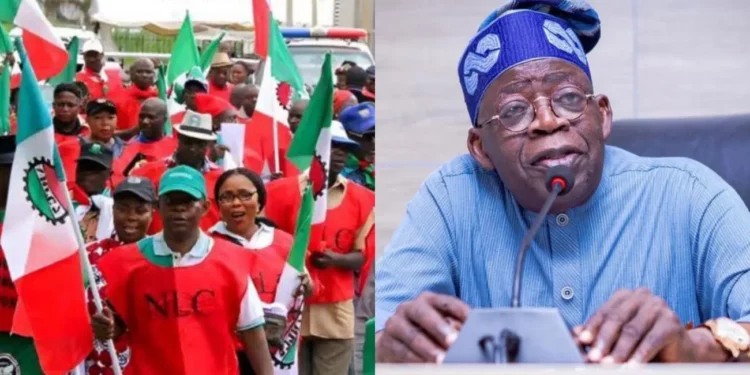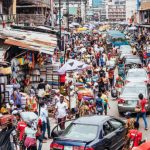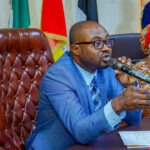The Clash Over Economic Reforms
In a bold move, the Nigerian Labour Congress (NLC) has publicly urged President Bola Tinubu to reject the recent advice of the World Bank regarding the country’s economic reforms. This call comes amid widespread hardship across Nigeria, where many citizens are feeling the pinch of ongoing economic changes.
The World Bank had advised Tinubu not to reverse his reforms, cautioning that doing so could lead to negative consequences. However, the NLC believes this advice is misguided and dangerous.
Join our WhatsApp ChannelNLC’s Head of Public Relations, Benson Upah, who spoke candidly about the situation, asserting that the World Bank does not have Nigeria’s best interests at heart. “If their advice in the past has not helped us, is it their latest advice that will?” Upah questioned. He characterised the World Bank’s stance as “an act of cruelty” towards the Nigerian people, urging the government to focus on developing a homegrown economic plan that genuinely addresses the nation’s challenges.
The Economic Reality on the Ground
The economic situation in Nigeria is dire. Citizens are grappling with rising prices and diminishing purchasing power, and the business community is feeling the strain. Upah emphasized the need for urgency in addressing these issues. “This advice will not fly, and there will be consequences if the Tinubu presidency takes it because the country is literally at a standstill. There is pain everywhere—even the business community is struggling,” he remarked.
The NLC argues that continuing with the World Bank’s recommended policies could exacerbate the existing hardships. Upah labeled the World Bank’s advice as a “complete invitation to chaos,” warning that it would be “highly counterproductive” if implemented. The NLC’s perspective highlights a crucial point: while international financial institutions often provide guidance, their recommendations may not always align with the realities faced by ordinary Nigerians.
Historical Context of World Bank Advice
This isn’t the first time the World Bank has offered advice to Nigeria, and the NLC points out that previous recommendations have often fallen short of their promises. Many citizens recall the economic reforms that have led to increased hardship without the expected improvements in living standards. These historical precedents fuel the NLC’s skepticism about the World Bank’s intentions and efficacy.
READ ALSO: NLC Condemns Petrol Price Hike, Seeks Immediate Reversal
“In times of crisis, it is imperative that we look within and develop solutions tailored to our unique challenges,” Upah said. He underscored the importance of creating policies that resonate with the everyday experiences of Nigerians. The NLC believes that local knowledge and expertise are vital in crafting effective economic strategies.
The Call for Homegrown Solutions
The NLC’s advocacy for a homegrown economic strategy emphasises the need for Nigeria to rely on its resources and talents. Upah argued that Nigeria has the potential to develop an economic plan that reflects the needs of its citizens. “We need to stop relying on external bodies to dictate our path. The solutions to our problems lie within us,” he stated.
This call for independence resonates with many Nigerians who have long felt the impact of global economic policies that do not consider their realities. The NLC’s position reflects a growing sentiment among citizens who desire more significant local input in decision-making processes, particularly regarding economic reforms.
Consequences of Ignoring Local Voices
Ignoring local voices and experiences can have significant implications for Nigeria’s future. The NLC warns that if the government continues to prioritize foreign advice over domestic realities, the potential for civil unrest and further economic decline increases. “The social fabric of our country is at risk if we do not listen to the voices of the people,” Upah cautioned.
As citizens continue to feel the effects of economic policies, the NLC’s call for a more localised approach becomes increasingly relevant. The need for policies that prioritize the welfare of Nigerians is clear, and the NLC’s message serves as a reminder of the importance of listening to local voices in shaping the country’s economic future.
The Way Forward for Nigeria
As the debate over economic reforms continues, President Bola Tinubu faces a critical decision. Should he heed the World Bank’s advice or forge a new path based on local input and realities? The NLC has made it clear that they believe the latter is essential for Nigeria’s survival and progress.
“We cannot afford to gamble with the lives of our people,” Upah asserted. The message from the NLC is clear: the government must prioritise the well-being of its citizens over external pressures. As Nigeria navigates these challenging times, the need for homegrown solutions and a commitment to addressing the pain of ordinary Nigerians has never been more urgent.
In conclusion, the NLC’s warning to President Tinubu serves as a rallying cry for those advocating for a more self-sufficient and responsive economic strategy. As the country faces tough choices, it is vital that Nigerian leaders remain attuned to the voices of their citizens and the unique challenges they encounter daily. Only by embracing local perspectives can Nigeria hope to overcome its economic hurdles and build a brighter future.
Emmanuel Ochayi is a journalist. He is a graduate of the University of Lagos, School of first choice and the nations pride. Emmanuel is keen on exploring writing angles in different areas, including Business, climate change, politics, Education, and others.


















Follow Us